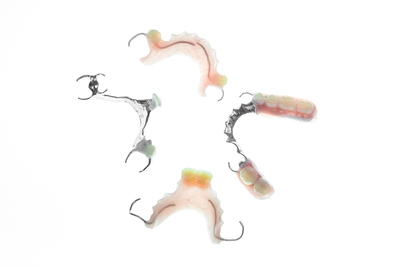
When it comes to tooth replacement options, many people agree that dental implants are the superior choice. Dental implants look and function like real teeth and help prevent jaw bone loss. But everyone is different, and for some patients, dental implants are not the best choice. They may be contraindicated for medical reasons or just not preferred by the patient. If you’re in need of tooth replacement, it’s important to understand all of your options. Take a look at some of the alternatives to dental implants.
Dentures are one of the dental implant alternatives that many patients are familiar with. When you think of dentures, you probably picture full mouth dentures—two dentures that are designed to replace both the upper and lower arches of teeth.
Full mouth dentures are an excellent choice when you’re missing all of your teeth, or when you’re planning to have all of your remaining teeth removed due to damage or disease. With your dentures in, you’ll appear to have a full set of straight teeth. Although dentures are an effective tooth replacement option that allows you to chew more thoroughly than you could with just gums or heavily damaged teeth, they don’t allow you to chew as effectively as dental implants or natural teeth, so your diet may be somewhat limited.

Partial dentures are individualized to fill in gaps in your mouth.
Partial dentures are used when you still have some healthy teeth but have several teeth that are missing and need to be replaced. The teeth on the partial denture are attached to a plastic base designed to match the color of your gums, so the dentures blend in with your other teeth. Often, this plastic material covers a metal frame and may have metal clasps that attach to your teeth.
Partial dentures allow you to speak and eat more easily, and are simple to remove for cleaning or repairs. However, partial dentures are sometimes uncomfortable and may be less stable than other tooth replacement options, requiring more frequent repairs.
Unlike total or partial dentures, fixed bridges are, as the name suggests, fixed in place. Your dentist will use a special type of bonding material to install the bridge in the space, and only your dentist can remove the bridge.
Because bridges are fixed in place, they may feel and function more like natural teeth, and you won’t have to worry that your bridge might come loose in your mouth. This may make you feel more comfortable than you would with dentures. You also don’t have to remove the bridge for cleaning, which eliminates the chance that you could lose the bridge or drop and break it—something that can happen with dentures.
On the other hand, a fixed bridge can be more difficult to clean properly because you can’t remove it. And bridges can sometimes damage the adjacent natural teeth, which means that you may have more dental bills in your future.
It’s important to discuss all of your tooth replacement options with your dentist so that you can decide the best choice for you. To talk to a dentist about your tooth replacement options, schedule a consultation.
FIND OUT MORE ABOUT HOW THE COMPASSIONATE TEAM AT STATION
DENTAL CAN HELP YOU FIND HEALTH & COMFORT WITH A SMILE.
When it comes to tooth replacement options, many people agree that dental implants are the superior choice. Dental implants look and function like real teeth and help prevent jaw bone loss. But everyone is different, and for some patients, dental implants are not the best choice. They may be contraindicated… Read More…